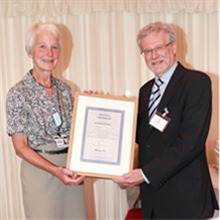DTA Publications Limited
David Tyldesley and Associates was a highly respected environmental planning consultancy established in 1983 with a widely acknowledged reputation for finding solutions at the interface of planning and other regulatory processes with landscape and nature conservation, particularly where the Habitats or Birds Directives applied. DTA Ecology Ltd was established in April 2015 to continue the work of David Tyldesley & Associates and further develop the reputation as a leading consultancy in the interpretation and application of the Habitats Regulations. We have established DTA Publications Limited to deliver a bespoke service through the Habitats Regulations Assessment Handbook and Journal.
The Authors
The handbook has been written by David Tyldesley FRTPI FCIEEM FRSA and Dr Caroline Chapman FCIEEM respected authors of guidance and leading practitioners with years of experience. The content has been checked, and will continue to be monitored by Graham Machin of Counsel. Their qualifications and experience are summarised in the following short CVs.
David Tyldesley FRTPI, FCIEEM FRSA
David was formerly the Principal of David Tyldesley and Associates (DTA), which was a nationally respected multi-disciplinary environmental planning consultancy that he founded in 1983. He stepped back from leading on consultancy and training work in March 2015 and is now a Co-Director of DTA Publications Limited and an Adviser to DTA Ecology Ltd which carries forward the DTA brand.
During 32 years of practice, as Principal of DTA, David worked for central and local government, statutory agencies, statutory undertakers, major companies and NGOs throughout the UK and Ireland. He helped to develop methods in sustainability appraisal, Strategic Environmental Assessment, Environmental Impact Assessment and Habitats Regulations Assessment in England, Scotland, Wales and Ireland. He was retained as a nature conservation planning advisor to Natural Resources Wales (formerly the Countryside Council for Wales), Natural England (formerly the Nature Conservancy Council, English Nature and the Countryside Agency) and Scottish Natural Heritage (SNH). He also advised the Governments of England, Northern Ireland, Scotland and Wales on nature conservation planning issues. David dealt with over 500 cases involving the Habitats Regulations in Britain between 1994 and 2015, including preparation of draft or ‘shadow’ Habitats Regulations Assessments (HRAs) on behalf of competent authorities for some of the most complex and controversial cases. From time to time he acted as expert or peer reviewer of HRAs being undertaken by a wide range of bodies in the UK and Europe.
He won a considerable reputation as an experienced, multi qualified expert witness at public inquiries and other hearings. Evidence he gave to some key “test case” inquiries established some important principles in the application of the Habitats Regulations and nature conservation generally. David was also a very experienced trainer, regularly providing bespoke specialist training courses, workshops and seminars.
He wrote authoritative guidance on the assessment of projects under the Habitats Regulations for the Countryside Council for Wales (CCW) and drafted guidance for the assessment of plans under the Habitats Regulations for CCW, SNH and Natural England. He was the original author of SNH’s seminal Handbook on Environmental Impact Assessment.
David receiv es his Certificate of Fellowship from Professor Penny Anderson C.Env FCIEEM, President of the Chartered Institute of Ecology and Environmental Management, during Institute celebrations at the House of Lords on 28th June 2012.
es his Certificate of Fellowship from Professor Penny Anderson C.Env FCIEEM, President of the Chartered Institute of Ecology and Environmental Management, during Institute celebrations at the House of Lords on 28th June 2012.
David is the only person to have been admitted to the Fellowship of both the Royal Town Planning Institute (RTPI) and the Chartered Institute of Ecology and Environmental Management (CIEEM) in recognition of his significant contributions to both professions.
In 2022 David was honoured to be awarded the CIEEM Medal for his outstanding contribution to the understanding and interpretation of environmental law and policy.
Dr Caroline Chapman B.Sc.(Hons), PhD, FCIEEM
Caroline is the Director of DTA Ecology Limited, an independent consultancy  established in April 2015 to continue the work of David Tyldesley & Associates, and co-Director of DTA Publications Limited. Caroline is an experienced specialist in the Birds and Habitats Directives, with over 15 years of professional practice in the interpretation and application of the Habitats Regulations across a range of regulated activities. Caroline has also developed a specialist interest in air pollution effects on ecosystems.
established in April 2015 to continue the work of David Tyldesley & Associates, and co-Director of DTA Publications Limited. Caroline is an experienced specialist in the Birds and Habitats Directives, with over 15 years of professional practice in the interpretation and application of the Habitats Regulations across a range of regulated activities. Caroline has also developed a specialist interest in air pollution effects on ecosystems.
Caroline began her working career as an Area Habitats Directive Co-ordinator with the Environment Agency before joining Natural England (then English Nature) to contribute to, and then lead on, Natural England’s input to the Environment Agency’s ‘Review of Consents’ procedures under the Habitats Regulations. In this national role, Caroline was responsible for relevant joint guidance; overseeing the development of procedural, technical and policy guidance to staff; advising on the requirements for assessments at individual sites; resolving difficult casework in consultation with appropriate specialists and local staff, and the provision of support and management to the Regional Officers. During her time at Natural England, alongside her national role as Project Manager for the Review of Consents, Caroline was also the National Specialist for Air Pollution.
Between 2007 and 2009, Caroline provided independent consultancy services sub-contracted to the European Commission checking conformity of measures of Member States to transpose the Birds and Habitats Directives in the context of complaint and infringement procedures; and also advising the Scotland and Northern Ireland Forum for Environmental Research (SNIFFER) on air-pollution effects on ecosystems at regional scales.
Caroline joined David Tyldesley & Associates as a Senior Habitats Directive Specialist in November 2009, since when she has been involved with peer review work, HRAs of development plans, drafting guidance and training. She also developed a portfolio of complex case work advising competent authorities on a diverse range of issues across England, Scotland and Wales, from the effects of new airfields and ports to the management of recreational pressures on European sites. More recently Caroline has taken a leading role in helping to forge innovative solutions to the effects of increasing phosphate levels in designated rivers and estuaries arising from new development, including providing expert witness evidence to a Public Inquiry for a local planning authority.
Graham Machin BCL, MA (Oxon), LARTPI Barrister
The content of the Handbook has been checked and will continue to be monitored by Graham Machin, BCL, MA (Oxon), LARTPI, of Counsel. Graham retired from private practice at the Bar in July 2015, having been a member of Ropewalk Chambers, Nottingham, since 1965. He was a member of the planning bar, developed a specialism in nature c onservation law, and over the last twenty years gained considerable experience advising on the legal effects of the Birds and Habitats Directives on the development and use of land. He was regularly instructed to advise and represent public bodies and non-governmental organisations, including Natural England and its statutory predecessors. He is a Legal Associate of the RTPI (since 1982) and has been an active member of the Nature Conservation Working Group of UKELA (the United Kingdom Environmental Law Association) since its inception in the late 1980s.
onservation law, and over the last twenty years gained considerable experience advising on the legal effects of the Birds and Habitats Directives on the development and use of land. He was regularly instructed to advise and represent public bodies and non-governmental organisations, including Natural England and its statutory predecessors. He is a Legal Associate of the RTPI (since 1982) and has been an active member of the Nature Conservation Working Group of UKELA (the United Kingdom Environmental Law Association) since its inception in the late 1980s.
Becca Holloway is our Office Manager and provides multi-skilled support across the Company including IT, quality management, financial and administrative duties.
" David Tyldesley & Associates have a long experience of involvement in the application of the Habitats Regulations Assessment process and this product usefully draws together the current state of collective understanding"
Janette Ward (Director Regulation, Natural England)
"Accessible, up to date and expertly written - this is a very useful source of guidance for competent authorities and others involved in assessing both projects and plans"
Adam Cole-King (Senior International Sites Adviser, Natural Resources Wales)
"This HRA Handbook brings a 20th century piece of legislation into the 21st century for everyone to understand"
Craig Rockliffe (Permitting and Conservation Team Leader, Environment Agency)
"This Handbook provides a useful guide to HRA application and case law in English territorial waters"
Lisa Chilton (Head of Offshore Industries Advice, Joint Nature Conservation Committee)
"The MMO is committed to enabling sustainable growth in making decisions about developoments at sea. We use the HRA Handbook to gain an overview of case law and help ensure consistency in our decision making"
Dickon Howell (Head of Licensing, Marine Management Organisation)
"A timely and much needed publication from the recognised and respected HRA experts"
Wyn Jones (Convenor of the Nature Conservation Working Group for the UK Environmental Law Association)
"We welcome this detailed guidance and informed discussion on what is a critically important and often complex area of European conservation legislation"
John Box (CEnv FCIEEM) (President of the Chartered Institute for Ecology and Environmental Management)
News
The Handbook content has been updated to take account of all recent judgments in the CJEU and the EU Exit amendment Regulations (4 January 2021).
We have advised the CIEEM In Practice editor that the approach described in the recent article on ‘A novel approach to quantify and mitigate for biodiversity loss caused by Nitrogen deposition’ is inappropriate. We believe that what is described as mitigation – offsite buffer area for habitat creation and improvement – is actually compensation for the harm to the habitats in the designated SAC. We advise that this approach should not be adopted without taking legal advice and consulting Natural England HRA and air quality specialists (12th January 2021).